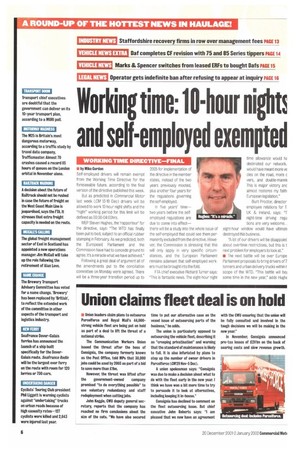Union claims fleet deal is on hold
Page 6

If you've noticed an error in this article please click here to report it so we can fix it.
Union leaders claim plans to outsource Parcelforce and Royal Mail's 44,000strong vehicle fleet are being put on hold as part of a deal to lift the threat of a national strike.
The Communication Workers Union issued the threat after the boss of Consignia, the company formerly known as the Post Office. told MPs that 30.000 jobs could be axed by 2003 as part of a bid to save more than £1bn.
However, the threat was lifted after the government-owned company promised "to do everything possible" to use voluntary redundancy and staff redeployment when cutting jobs.
John Reggie, CWU deputy general secretary, reports that the company has reached no firm conclusions about the size of the cuts. "We have also secured time to put our alternative case on the vexed issue of outsourcing parts of the business," he adds.
The union is particularly opposed to outsourcing the vehicle fleet, describing it as "creeping privatisation" and warning that the standard of maintenance is likely to fail. It is also infuriated by plans to step up the number of owner drivers in Parcelforce (CM29 Nov-5 Dec).
A union spokesman says: "Consignia was due to make a decision about what to do with the fleet early in the new year. I think we have won a bit more time to try to persuade it to look at alternatives, including keeping it in-house."
Consignia has declined to comment on the fleet outsourcing issue. But chief executive John Roberts says: "I am pleased that we now have an agreement
with the CWU ensuring that the union will be fully consulted and involved in the tough decisions we will be making in the new year."
In November. Consignia announced pre-tax losses of £281m on the back of soaring costs and slow revenue growth.




























































































































































